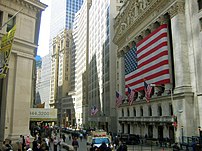 Image via Wikipedia
Image via WikipediaU.S. Automakers currently sent home to re-think their requests for a bailout package from Congress have run into two major problems bode poorly for the U.S. and the global economy.
First, the policy drift in Washington that's taking place as we all hold our breath for the Bush Administration to pack its bags couldn't have come at a worse time: the speed at which the economic fallout is now coming back to depress the stock markets has been a matter of weeks, not months, and I really shudder to think how much worse it can get between now and January 20, 2009. And, frankly, our Congress just doesn't seem up to making a decision, whether for pure fright at the enormity of the consequences, or because we're just in the political doldrums until Obama's inauguration.
The second problem is a kind of "Chicken Little" problem. Our American automobile manufacturers have been back to Washington over and again for help to "stay competitive", "to retool" or otherwise to stay in business. Patience among taxpayers and their reps in Washington is wearing understandably thin, but all signs actually point to the sky falling this time. At a time when we have shudders at hearing of over 200,00 layoffs on Wall Street alone, imagine the tsunami effect if Detroit, the poster child for supply chain economics, fails: best estimates are millions of 2.5 million to 3 million jobs lost -- in the heart of the country.
In the broader contest of the debate between conservatives and liberals over how much intervention, how much regulation, how much government should be involved -- and over the fundamental soundness of our financial system, the reality of an entire industry sector poised for failure is sobering for its fear factor alone: witness yesterday's stock market plunge. The ripple effect that will be quickly seen spreading out among Detroit's supply chain will have a corollary effect among all industries. Will others follow Detroit? The last thing we need is for Washington to go numb in the brain at a time when action alone has a psychological calming effect. The less of Chicken Little is that his call is so disturbing that people just shut down and tune out, and while no one is tuning out, fear of action in the face of the enormity of the consequences is the equivalent.
January 20th can't come soon enough, but I really worry about what's in store for us over the next 8 weeks.

![Reblog this post [with Zemanta]](http://img.zemanta.com/reblog_e.png?x-id=ef6a857c-d958-464f-9563-ba0c09cda3ee)

![Reblog this post [with Zemanta]](http://img.zemanta.com/reblog_e.png?x-id=fee6a145-b28c-423d-b157-ab40de000389)